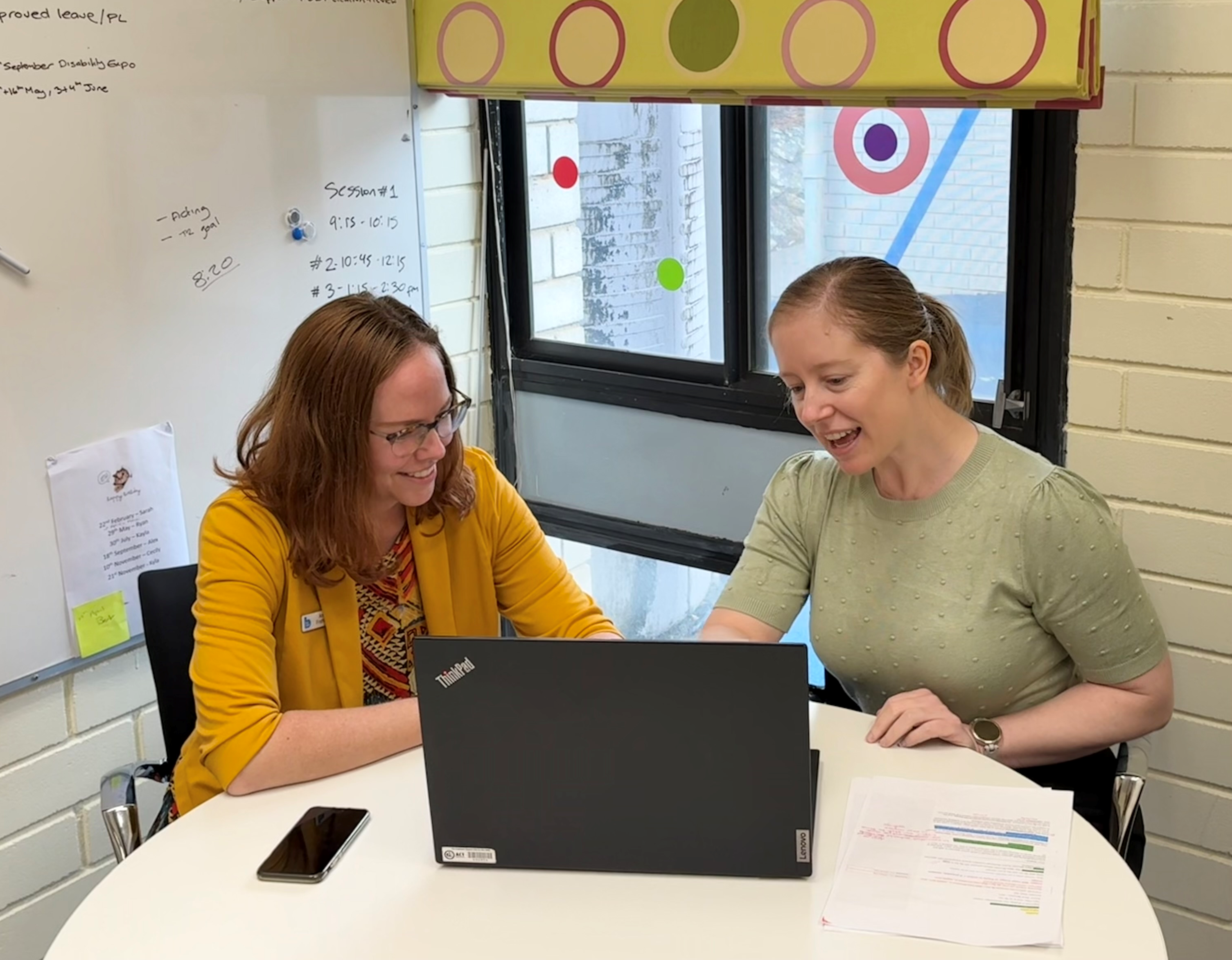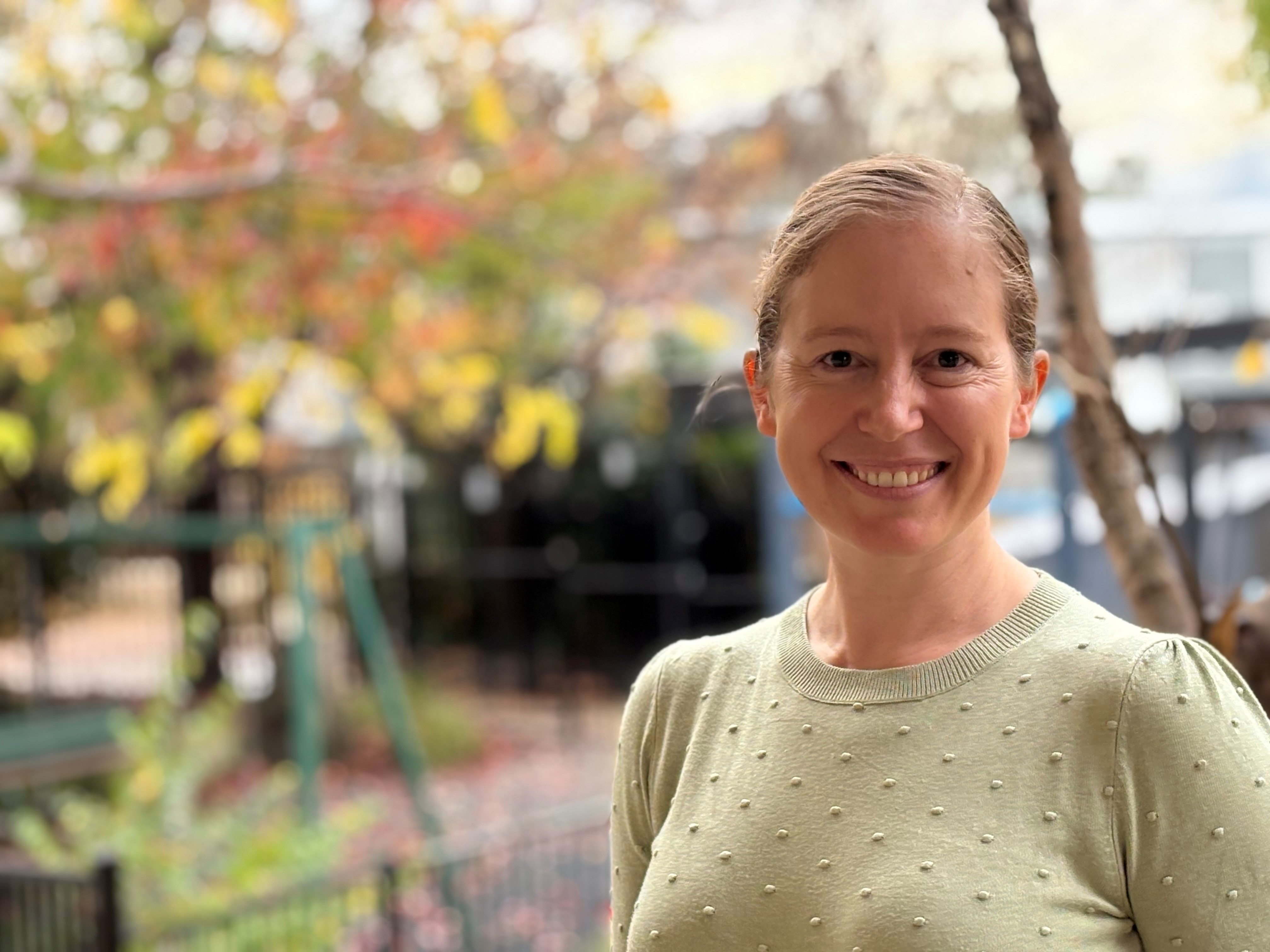
Dr Kayla Ball, Director of Allied Health team, Black Mountain School
“In specialist schools, days are fast paced, and we must support our staff to thrive in these complex settings.”
Supporting students with complex needs requires a whole-school approach to staff and student wellbeing. Black Mountain School is a specialist school in the Canberra region, dedicated to delivering academic and practical based learning tailored to the individual needs of their 120 students in Years 7–12.
Their staff structure includes specialist Learning Support Assistants (LSAs), classroom teachers, executive teachers and allied health professionals.
Black Mountain wanted to focus on the key areas identified by leadership including how they:
- communicate,
- connect with each other,
- support staff to build positive wellbeing across the school.
Dr Kayla Ball, Director of the Allied Health team, started in a pilot role to focus on two key areas: staff wellbeing and leading the Allied Health professionals employed at the school. Fundamentally, Black Mountain School was looking for a wellbeing framework to support the school's goal around embedding staff wellbeing strategies.
It was the Be You Framework, the evidence-informed tools and resources and strong consultant support that stood out from other models.
“I was excited by the framework and evidence-informed tools and resources, and so was our leadership team.”
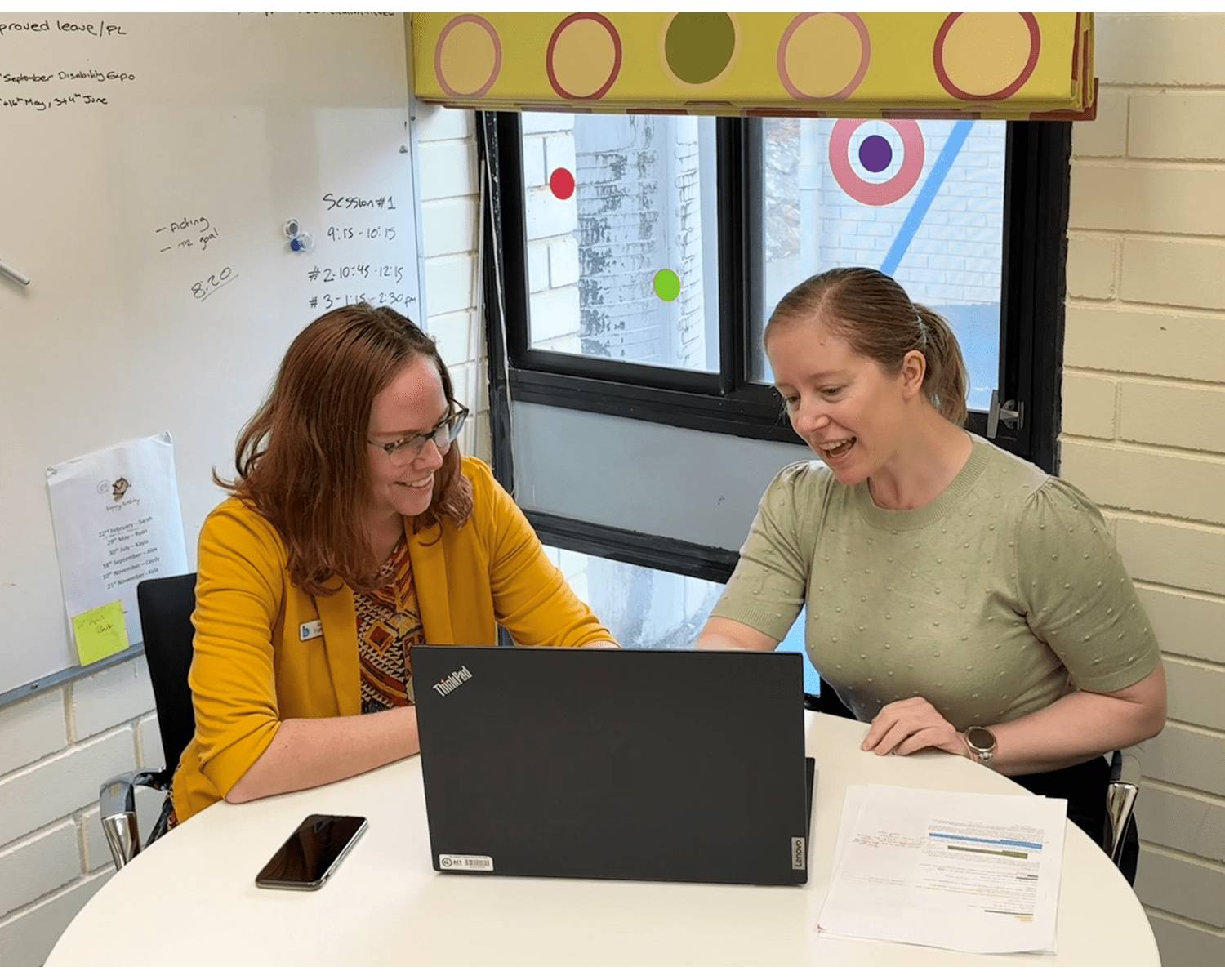
Be You Consultant Amy Fratturo with Action Team Leader Dr Kayla Ball
“Implementing Be You has been successful because of the Be You Framework and of the support of our Be You Consultant.”
|
The staff met to discuss the 6 key contributors:
|
The six contributors to educator wellbeing |
The evidence-informed Be You resources gave Kayla and the leadership team the clarity to select wellbeing strategies that prioritised the interests of staff and fostered collegial relationships.
The team were diligent to always link any staff wellbeing strategies and activities to one of the six contributors to educator wellbeing. This helped to anchor the activities to a robust staff wellbeing strategy, rather than have them seem ad hoc or tokenistic.
Priorities began to emerge:
- How do we strengthen collegial relationships?
- What governance and policy measures need leadership support?
- How do we measure our impact and, or identify what we need to keep working on?
Kayla’s strategies to embed staff wellbeing in a specialist school setting:
|
|
Strategy and activities |
The outcome |
|
Individual educator |
Support and promote wellbeing activities by:
Promoting and developing activities during Wellbeing week in Term 3. |
Staff engagement through wellbeing activities of their choice. Greater support, surveys have indicated staff feel more supported. Increased willingness of staff to engage in mental health and wellbeing strategies that suited them. |
|
Collegial relationships |
Strengthen relationships by: Providing optional activities to build staff connection such as:
|
Stronger staff relationships. Anecdotally, Kayla has seen more personal engagement between staff, strengthening their relationships and sense of connection to the school. |
|
Workplace culture |
Create a positive inclusive culture and environment by:
|
Staff engaged in contributing to the development and maintenance of a positive workplace culture. Surveys have indicated staff feel they are listened to, supported and acknowledged for the work they do.
|
|
Leadership |
Support of leadership by:
|
A whole of setting approach to prioritising educator wellbeing. Leadership’s prioritisation of staff wellbeing through resourcing and actions sends a clear message that staff are valued, while also supporting the long-term implementation of effective and meaningful wellbeing strategies.
|
|
Governance and policy |
Strong governance and well-developed policies provide:
|
Staff have a clear understanding of their roles, responsibilities and support systems which reduces ambiguity and increases staff wellbeing. |
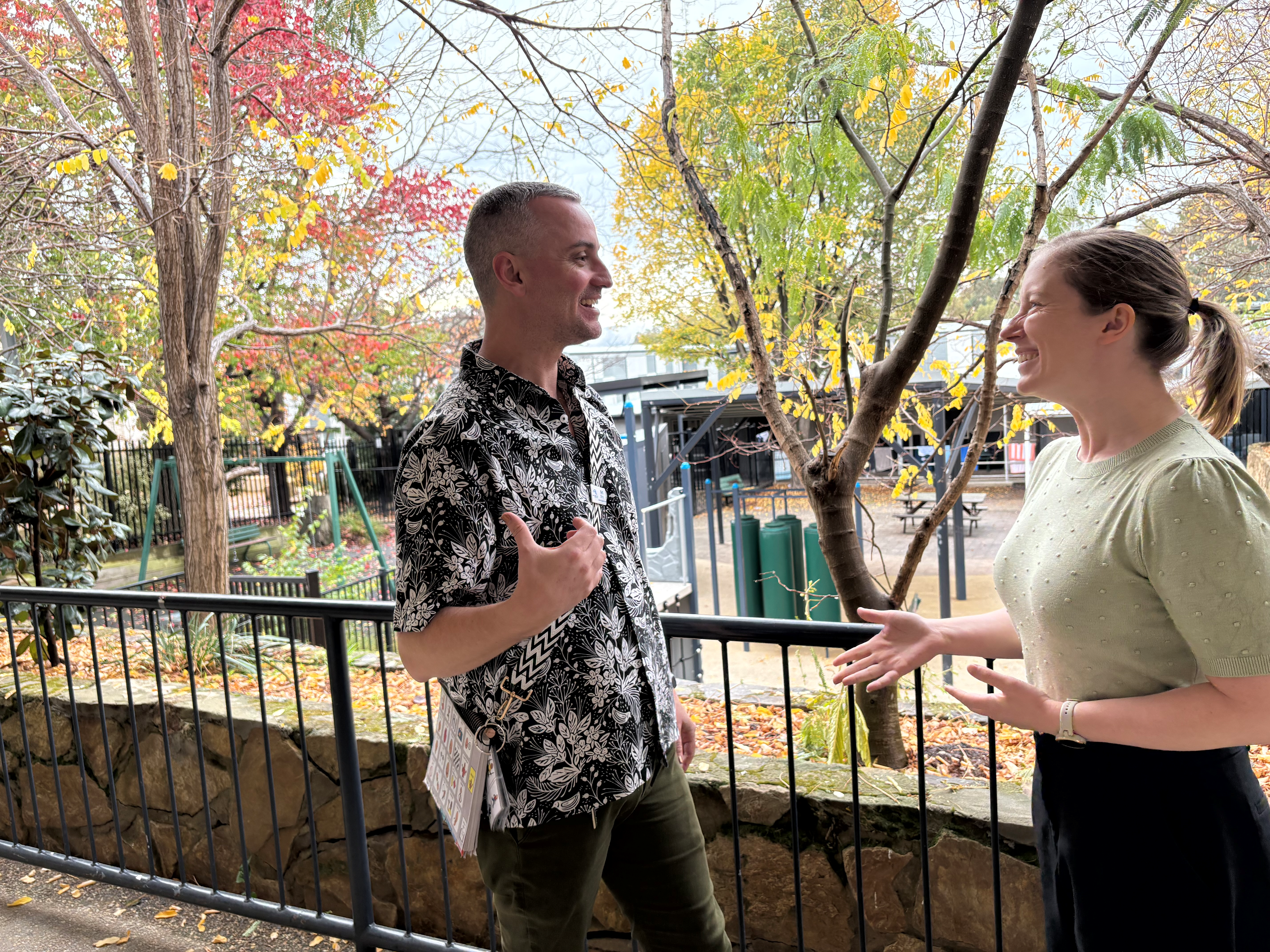
Dr Kayla Ball standing outside with a colleague
“By providing staff surveys every three months we could identify what was working and what we needed to improve.”
Measuring impact
Staff surveys have become a term-based touch point. They act as a check-in, and a review of what is working and/or needed to be adjusted to improve the mental health and wellbeing of staff.
The data generated has also provided the data and evidence to inform staff and leadership on next steps.
Why Kayla has found the implementation of Be You successful.
- The ongoing support of a dedicated consultant
- The Be You Beyond Self Care: An Educator Wellbeing Guide, provides a model to frame conversations and set goals for your unique school setting around staff wellbeing.
- Be You Resources are evidence-informed giving you confidence in them.
Initiating the conversation with a Be You Consultant lays the foundations, as every school is different, the consultant’s role is to listen and guide you through the tools, resources and professional learning modules to meet the needs of your school’s setting.
“Be You gives me the opportunity to apply the framework to our unique needs.”
Kayla’s tips to set up the foundations:
- Schools are busy places, so schedule your next Be You Consultant meeting during the meeting.
- Compile questions between meetings from staff as they come up for discussion with your Be You Consultant.
- Be curious when reviewing your staff surveys and think outside the box.
- Promote relevant Be You resources in staff spaces as reminders to support mental health and wellbeing.
- Recognise the successes and build on your them to be agile in your planning.
- Weekly shoutouts are a great way to promote a culture of valuing each other.
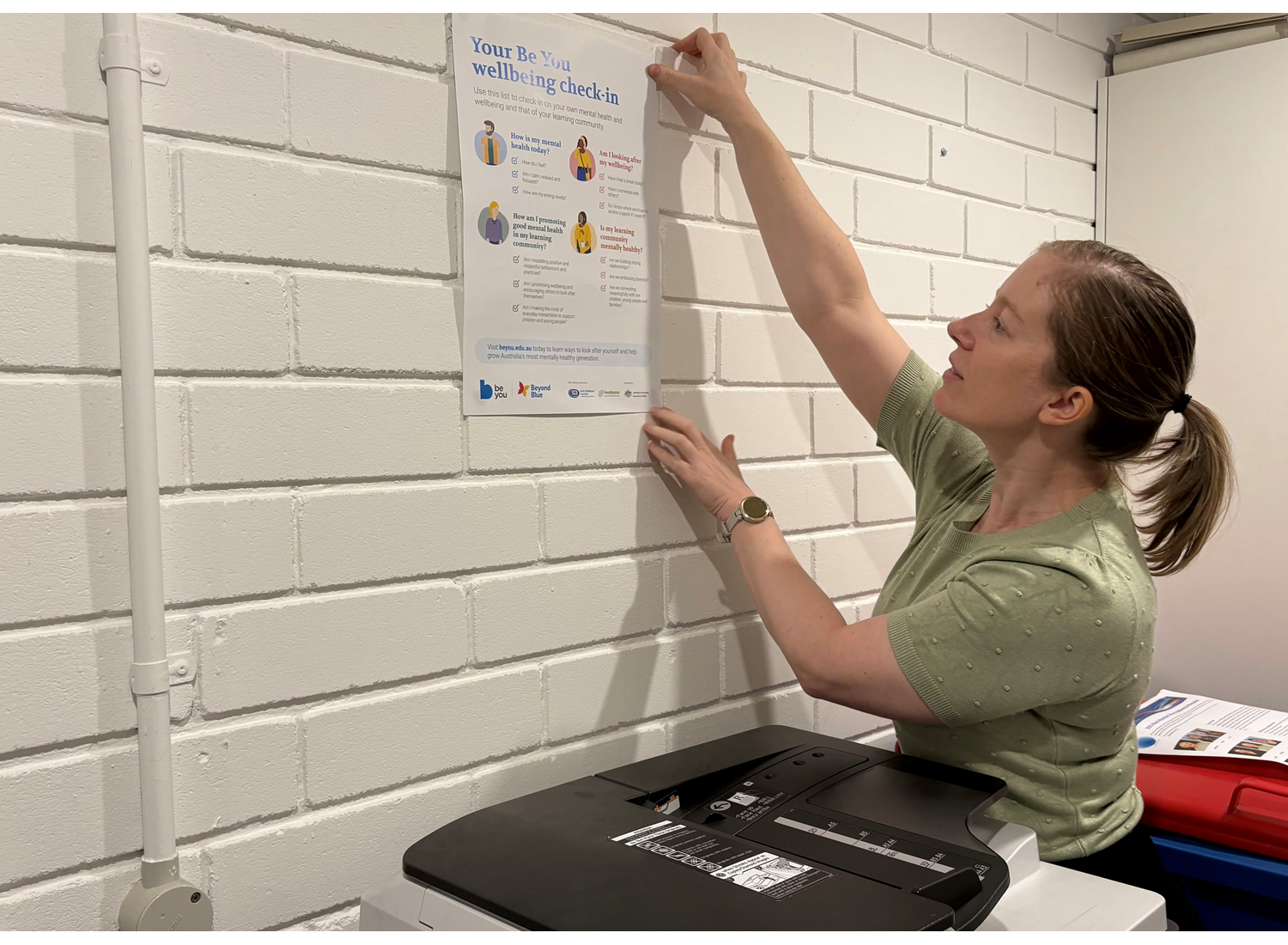
Dr Kayla Ball putting up a poster on a wall
Reflective questions
Be You has provided the following reflection questions to help you consider how this might apply in your school:
- What are the main mental health and wellbeing concerns in your school?
- What are the barriers to staff wellbeing?
- How can these barriers be addressed to support positive mental health and wellbeing?
Connect with us if you are not sure where to start.
